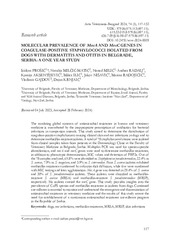Приказ основних података о документу
Molecular prevalence of MecA and MecC genеs in coagulasе-positive staphylococci isolated from dogs with dermatitis and otitis in Belgrade, Serbia: a one year study
| dc.creator | Prošić, Isidora | |
| dc.creator | Milčić Matić, Natalija | |
| dc.creator | Milić, Nenad | |
| dc.creator | Radalj, Andrea | |
| dc.creator | Aksentijević, Ksenija | |
| dc.creator | Ilić, Milica | |
| dc.creator | Nišavić, Jakov | |
| dc.creator | Radojičić, Marina | |
| dc.creator | Gajdov, Vladimir | |
| dc.creator | Krnjaić, Dejan | |
| dc.date.accessioned | 2024-03-20T11:53:33Z | |
| dc.date.available | 2024-03-20T11:53:33Z | |
| dc.date.issued | 2024 | |
| dc.identifier.issn | 0567-8315 | |
| dc.identifier.uri | https://vet-erinar.vet.bg.ac.rs/handle/123456789/3763 | |
| dc.description.abstract | The escalating global concern of antimicrobial resistance in human and veterinary medicine is exacerbated by the inappropriate prescription of antibiotics for bacterial infections in companion animals. This study aimed to determine the distribution of coagulase-positive staphylococci causing clinical skin and ear infections in dogs and to determine methicillin-resistant isolates. A total of 78 staphylococcal strains were isolated from clinical samples taken from patients at the Dermatology Clinic at the Faculty of Veterinary Medicine in Belgrade, Serbia. Multiplex PCR was used for species-specific identification, and mecA and mecC genes were used to determine methicillin resistance, in addition to phenotypic determination, MIC values and detection of PBP2a. Out of the 78 samples analyzed, 65.8% were identified as Staphylococcus pseudintermedius, 22.4% as S. aureus, 7.9% as S. coagulans, and 3.9% as S. intermedius. Four S. aureus isolates exhibited methicillin resistance confirmed by cefoxitin disk diffusion, while five were confirmed with MIC testing and latex agglutination. MecA gene was detected in 29.4% of S. aureus and 30% of S. pseudintermedius isolates. These isolates were classified as methicillin- resistant S. aureus (MRSA) and methicillin-resistant S. pseudintermedius (MRSP), respectively. No isolates carried the mecC gene. This study provides insights into the prevalence of CoPS species and methicillin resistance in isolates from dogs. Continued surveillance is essential to monitor and understand the emergence and dissemination of antimicrobial resistance in veterinary medicine and the results of this study accent the need for establishment of a continuous antimicrobial resistance surveillance program in the Republic of Serbia. | sr |
| dc.language.iso | en | sr |
| dc.publisher | Beograd : Fakultet veterinarske medicine | sr |
| dc.relation | info:eu-repo/grantAgreement/MESTD/inst-2020/200143/RS// | sr |
| dc.rights | openAccess | sr |
| dc.rights.uri | https://creativecommons.org/licenses/by/4.0/ | |
| dc.source | Acta Veterinaria | sr |
| dc.subject | dogs | sr |
| dc.subject | ear infections | sr |
| dc.subject | methicilin resistance | sr |
| dc.subject | MRSA | sr |
| dc.subject | MRSP | sr |
| dc.subject | skin infections | sr |
| dc.title | Molecular prevalence of MecA and MecC genеs in coagulasе-positive staphylococci isolated from dogs with dermatitis and otitis in Belgrade, Serbia: a one year study | sr |
| dc.type | article | sr |
| dc.rights.license | BY | sr |
| dc.rights.holder | Fakultet veterinarske medicine | sr |
| dc.citation.volume | 74 | |
| dc.citation.issue | 1 | |
| dc.citation.spage | 117 | |
| dc.citation.epage | 132 | |
| dc.identifier.doi | 10.2478/acve-2024-0009 | |
| dc.identifier.doi | 10.2478/acve-2024-0009 | |
| dc.identifier.fulltext | http://veterinar.vet.bg.ac.rs/bitstream/id/11257/bitstream_11257.pdf | |
| dc.type.version | publishedVersion | sr |

